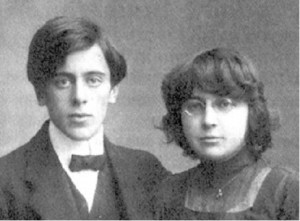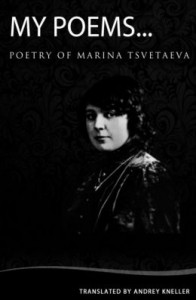The life of Russian poet Marina Tsvetaeva reads like a microcosm of the tragedy that befell Russia in the first half of the 20th century. Born in 1892 in Moscow to an upper class family, she married fairly young, only to have her firstborn child, a son, raised by her in-laws, with her husband’s concurrence. Two daughters followed.
She published her first book of poems when she was 18, and she was something of an overnight literary sensation. She continued to publish, and then came World War I and the Russian Revolution. Her husband, Sergei Efron, joined the White Army during the Russian civil war. During the great Moscow famine in 1919, she placed her daughters in a state orphanage; one of them died of starvation. Three years later, the family fled Russia and eventually settled in Paris. They lived in poverty; her husband found work as an agent for the Soviet secret police.

Sergei Efron and Marina Tsvetaeva
Returning to Russia in 1939, her husband was arrested and executed, and her surviving daughter was sent to a labor camp. She and her son fled eastward as the German armies invaded Russia. In August 1941, Marina Tsvetaeva committed suicide.
What she left behind was her poetry: poems full of passion, emotion and yearning; poems about love; and poems about the devastation of a country—and devastation of a life.
“In the Winter” is from a collection of selected poems entitled My Poems, translated and published in 2011 by poet Andrey Kneller.
The bells again break the silence,
Waiting with remorse…
Only several streets divide us,
Only several words!
A silver sickle lights the night,
The city sleeps this hour,
The falling snowflakes set alight
The stars upon your collar.
Are the sores of the past still aching?
How long do they abide?
You’re teased by the captivating,
New and shimmering eyes.
They (blue or brown?) are dearer
Than anything pages hold!
Their lashes are turning clearer
Out in the freezing cold…
The church bells have faded to silence
Powerless from remorse…
Only several streets divide us,
Only several words!
The crescent, at this very hour,
Inspires poets with its glow,
The wind is gusting and your collar
Is covered with the snow.

The poems in the collection range in date from 1909 to 1938. Thematically they fit with “In the Winter”; you won’t find many allusions or references to the turmoil and tragedy she experienced throughout her life. These are poems of love and strong emotion, something of the poet’s trademark.
Kneller says that Tsvetaeva is still a beloved poet in Russia, with only Anna Ahkmatova as possibly more popular. Reading My Poems helps explain why—in the face of a series of monumental family and national tragedies, she uses love as a compass. It may be discarded love, a passionate love affair, unrequited love, or a love deliberately expressed from afar, but it is still love. With love there is still hope, even if the lover is no more.
Featured photo by Andrew Kuznetsov, Creative Commons, via Flickr. Image of poet by Basheer Tome. Sourced via Flickr. Post by Glynn Young, author of the novels Dancing Priest and A Light Shining, and Poetry at Work
Want to brighten your morning coffee?
Subscribe to Every Day Poems and find some beauty in your inbox.
- Longfellow’s “Paul Revere’s Ride”: Creating a National Legend - April 17, 2025
- Poets and Poems: Katie Kalisz and “Flu Season” - April 15, 2025
- Poets and Poems: Michelle Ortega and “When You Ask Me, Why Paris?” - April 10, 2025

L. L. Barkat says
Such sorrow.
I find myself feeling very grateful for the lovely life I lead. Simple pleasures like the blueberries I just harvested from my back yard, and the miniature white daisies with the purple centers I planted today. The breeze and how it tussles the trees so musically this morning.
I wish I could give her a cup of tea and a quiet place in the sun.
davis rosback says
the means of escape
like heat set to water
until it floats in midair
dreams put to paper
Sandra Heska King says
Are the sores of the past still aching?
Oh, wow. What beauty to come out of such a hard, sad life.
Marcy Terwilliger says
Hard times,
Lost loves.
Longings,
Goodbyes.
Grief so overwhelming,
No escape.
Reminders of the past,
Too much for one to take.
Life is not worth living
Sometimes.
Glynn says
Marcy – that may well sum up her life.
Glynn says
Marcy – thanks for the poem – it may well sum up her life.